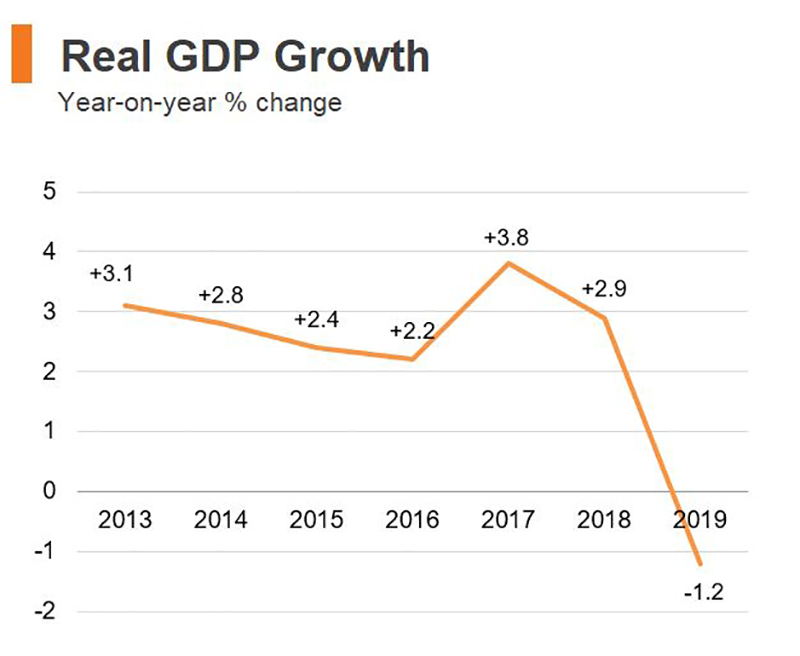For those who question why China is bothering to have preventive measures much before than 2047 which they actually agreed to, “One country, two systems” was never intended to result in Hong Kong spinning out of China’s control. Under the Basic Law that China crafted as Hong Kong’s “mini-constitution,” Beijing retained the right to prevent any challenge to what it considered its core security interests. The law empowered Beijing to determine if and when the people of Hong Kong could directly elect the territory’s leadership. It also allowed Beijing to veto laws passed by the Hong Kong Legislative Council, and granted China the right to make final interpretations of the Basic Law.
China, however, has seen the current scenario as a silver lining in light of its own economic slowdown. Trump’s trade war is hurting China’s economy. In fact, China’s economic growth stalled to a 27-year low of 6.6%. The protests in Hong Kong give China an opportunity to quell that discontent by redirecting their attention toward a common enemy – the demonstrators, who, according to government accounts broadcast on state television, are violent and often paid provocateurs doing America’s bidding. China also blames the US administration to legalize the protests as they wish to create a double high attack from both their internal and external sites.

In 1997, Hong Kong’s GDP was equivalent to 18 percent of the mainland. Chinese companies raised most of their capital on the Hong Kong stock exchange. Today, things are vastly different. In 2018, Hong Kong’s GDP was equal to only 2.7 percent of the mainland. Shenzhen alone has overtaken Hong Kong in terms of GDP. Less than 12 percent of China’s exports now flow through Hong Kong. The combined market value of China’s domestic stock exchanges in Shanghai and Shenzhen far surpasses that of the Hong Kong Stock Exchange. Investment flowing into and out of China still tends to pass through financial holding vehicles set up in Hong Kong, in order to benefit from the region’s legal protections. But China’s new foreign investment law (which will take effect on January 1, 2020) and other recent policy changes mean that such investment will soon be able to bypass Hong Kong. And although Hong Kong remains the largest offshore clearing centre for renminbi, that role could easily be filled by London or Singapore, if Chinese leaders so desired. Wrecking Hong Kong’s economy by using military force to impose emergency rule would not be a good thing for China. But the negative effect on the mainland’s prosperity would not be strong enough to prevent Beijing from doing whatever it believes is necessary to maintain control over the territory.
To make them the giant in the South Asia and to have no repercussions thereof on the economic front, China wants the full power to control their sea trades from the South China Sea, preserve their economy by taking over one of the efficient trade centres of the world and establish their dominance in the world.
Meanwhile, Beijing has started tackling the economic problems that it believes are the source of much of the anger among Hong Kongers. Housing prices have tripled over the past decade. The median rent has increased by nearly 25 percent in the past six years. As many as 250,000 people are waiting for public housing. At the same time, income growth for many Hong Kong residents has fallen below the overall increase in cost of living.
What’s at stake for other countries? Well, the US-China Economic and Security Review Commission warned that the new law could “create significant risks for US national security and economic interests in the territory”. It said the law would allow Beijing to pressure Hong Kong to extradite US citizens living or passing through the territory under “false pretenses”. The EU, UK and Canada have also expressed serious concerns over the proposed amendment while the Hong Kong International Chamber of Commerce said the changes could cause businesses to reconsider selecting the city as their regional headquarters.
In conclusion, Hong Kong citizens are free but bound in chains. The extradition can work in the favour of promoting peace and prohibiting criminal activities in foreign lands but at the same time, the misuse of power is the biggest concern hovering over its citizens. Do you believe that there is a space for the “one nation, two systems” to thrive or is the system reaching its end?

Kalptaru Agarwal
Senior MemberKalptaru has been with the Finance and Investment Cell since 2019.
He has worked on several consultation projects for F&IC.

